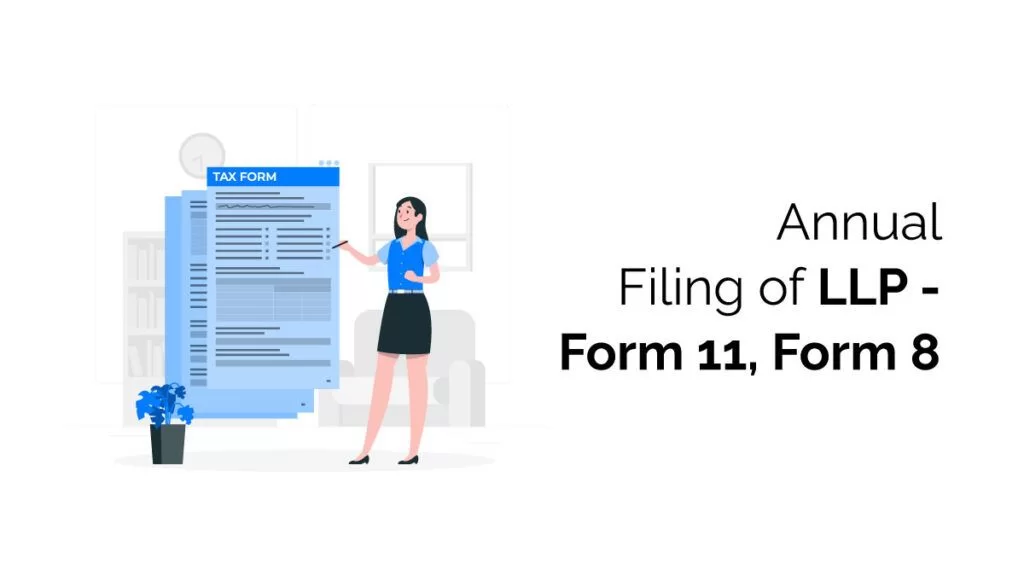Have you ever heard of the saying, “Better safe than sorry”? This is a phrase that perfectly encapsulates the requirement for LLP companies to submit returns, even if they have not conducted any business. Limited Liability Partnerships (LLPs) are a popular business structure in India governed by the Limited Liability Partnership Act of 2008. Annual filing of LLPs offer many benefits, including limited liability protection and flexible management structures. However, one of the lesser-known requirements for LLPs is the need to submit returns, even if they have not conducted any business. While this may seem unnecessary, it is a precautionary measure that can help protect the LLP from legal and financial consequences down the line.
Let’s explore why LLPs need to submit returns, the consequences for not doing so, and how to ensure compliance with this important requirement.
As per the rules of the Limited Liability Partnership Act of 2008, all LLPs registered in India must file annual returns with the Registrar of Companies (ROC) every year. The annual filing includes two forms: Form 11 and Form 8.
Both Form 11 and Form 8 are important documents as they provide crucial information about the LLP to the Registrar of Companies (ROC), other government authorities, and stakeholders. Failure to file these forms can lead to penalties and fines; in some cases, the LLP may lose its status as a legal entity.
LLP Form 11
According to the Indian LLP Act, 2008, all registered LLP companies need to submit the file of annual return within 60 days of the closing of the financial year. The form should have details of LLP, company partners, designated partners and the contribution made by each partner. The details of the total contribution made by the LLP company and its partners are required to be included in LLP Form 11. However, details of any notice received regarding penalties are not required to be included in either Form 11 or Form 8.
It is important to note that LLPs should ensure they comply with all the requirements under the LLP Act, 2008, while filing their annual returns and statements of accounts and solvency. Any non-compliance with the filing requirements may attract penalties and affect the LLP’s reputation.
LLP Form 8
LLPs are required to file Form 8 – Statement of Account and Solvency with the Registrar of Companies (RoC) within 30 days from the end of six months of the financial year. The form serves as a declaration by the LLP of its financial position and ability to pay its debts and liabilities. The prescribed fees for filing LLP Form 8 vary depending on the period of delay in filing, and non-compliance can result in penalties and fines for the LLP and its partners.
Non-filing or delayed filing of Form-8 can cause penalties and fines for the LLP and its partners. Therefore, it’s crucial to ensure that the form is filed on time with complete and accurate information and that a qualified professional audits the financial statements.
Auditing is mandatory for all LLPs
As per the provisions of the LLP Act, 2008, LLPs are required to get their accounts audited if their annual turnover exceeds Rs. 40 lakhs or if their total contribution exceeds Rs. 25 lakhs. This audit is mandatory and must be conducted by a qualified Chartered Accountant.
However, if an LLP’s turnover or contribution falls below the prescribed limits, it may not be required to undergo a statutory audit. In such cases, the LLP may choose to conduct an audit voluntarily as per the standard auditing rules.
Even if an LLP is not required to undergo a statutory audit, it is still required to maintain proper books of accounts and file annual returns with the Registrar of Companies. These annual returns must be certified by a designated partner of the LLP.
Annual Filing of LLP – Penalty
If the LLP company doesn’t file a return, the company must pay a penalty amount of Rs.100 per day till the date of filing. Therefore, LLPs must file their annual returns and statement of accounts on time to avoid such penalties and other consequences.
Process for LLP Annual E-filing
LLP annual e-filing refers to the electronic submission of annual compliance documents to the Ministry of Corporate Affairs (MCA) by Limited Liability Partnerships (LLPs) in India. Here’s a step-by-step process for LLP annual e-filing:
Step 1: Log in to the MCA (Ministry of Corporate Affairs) portal using your LLP credentials.
Step 2: Click on the “LLP Forms” tab on the top menu bar.
Step 3: Select “Annual Return of LLP (Form 11)” from the drop-down list and fill in the required details of the LLP and its partners and designated partners. Attach necessary documents like changes in the LLP agreement, if any.
Step 4: Click on “Check Form” to validate Form 11. If there are any errors, make the necessary corrections.
Step 5: Once Form 11 is error-free, click on “Submit” and pay the requisite fees online.
Step 6: Next, select “Statement of Account and Solvency (Form 8)” from the drop-down list and fill in the LLP’s financial details, including its income, expenditure, assets, liabilities, and statement of solvency. Attach necessary documents like audited financial statements and bank statements.
Step 7: Click on “Check Form” to validate Form 8. If there are any errors, make the necessary corrections.
Step 8: Once Form 8 is error-free, click on “Submit” and pay the requisite fees online.
Step 9: After payment, the system will generate an acknowledgement receipt containing a unique Service Request Number (SRN), which can be used to track the status of the forms.
Step 10: Keep a copy of the acknowledgement receipt and the filed forms for future reference.
These exact steps involved in submitting the LLP Annual filing may vary depending on the specific requirements and procedures of the Ministry of Corporate Affairs at the time of filing. It’s recommended to refer to the latest guidelines and instructions the MCA provides while submitting the form.
Practical knowledge in filing LLP forms is crucial for accounting professionals to excel in legal compliance. This skill enables them to provide valuable guidance, identify cost-saving opportunities, and streamline administrative processes. By mastering LLP compliance, accounting professionals become valuable assets to their organisations and the industry. Finprov is an ed-tech institute that provides certification courses for the Annual Filing of LLP Form 11 and Forms 8. Our Annual Filing of Form 11 course covers the concepts of Introduction to Form 11, Detailing of documentation, and the Filing process of form 11 on the MCA website.
We also offer an LLP- Form 8 course that covers the concepts of Introduction to Form 8, About liability, MCA websites, Process of LLP e-filing, Familiarisation with account recording, and About the limited liability partnership. The courses are designed for graduates and professionals interested in starting or upskilling their careers in finance and accounting.
Moreover, at Finprov, we offer various courses, including CBAT, PGDIFA, PGBAT, Income tax, GST, SAP FICO, Tally Prime, MS Excel, and more. One of the unique benefits of our courses is the combination of theoretical and practical training that equips aspirants with the necessary skills to apply accounting concepts in real-world situations. Additionally, we provide placement assistance to help graduates secure their desired positions in various sectors, further reinforcing our commitment to excellence.










